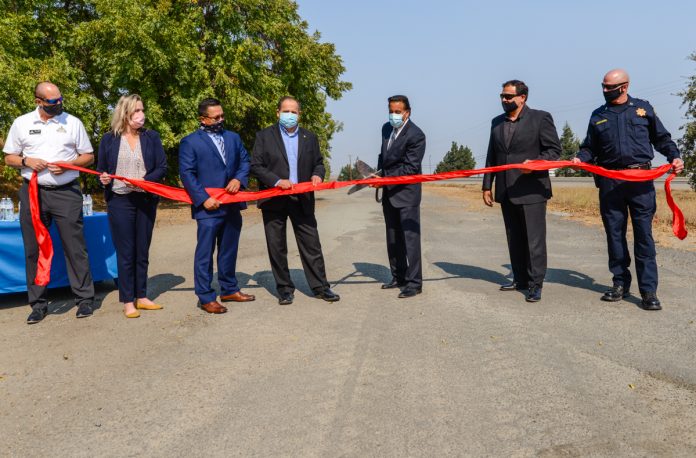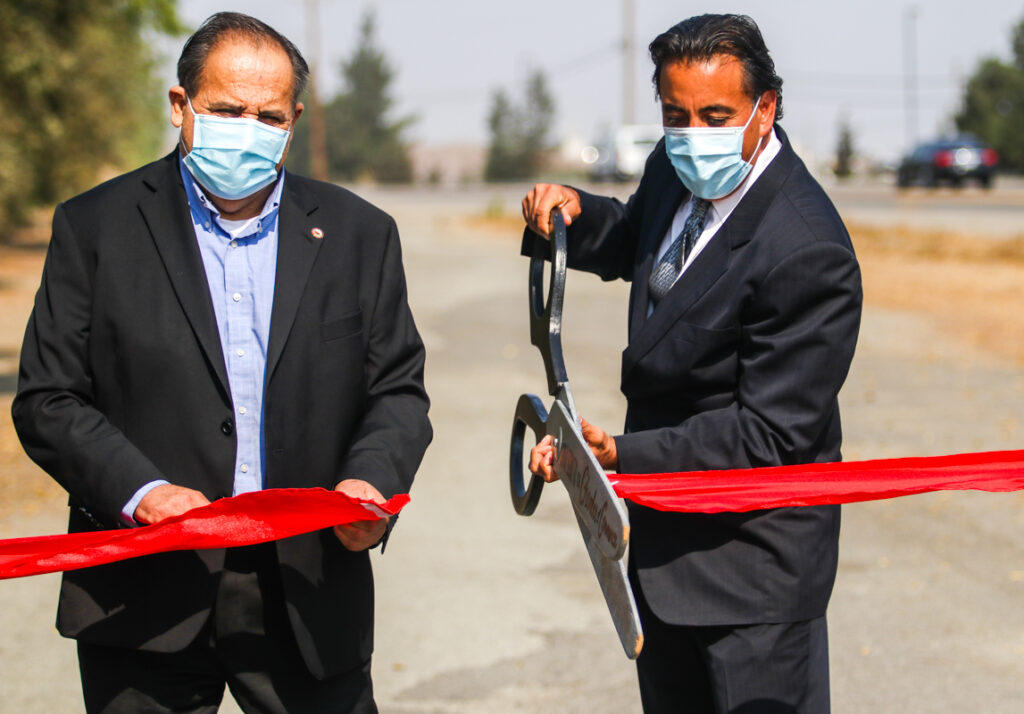
The expansion project for Highway 25 has been an ongoing quandary in San Benito County that has spanned for more than two decades, leading to nothing but a road of dead ends.
But that’s about to change after the Council of San Benito County Governments on Oct. 7 held a ribbon cutting ceremony that officially kicked off a project initiation, which will convert the highway from two to four lanes in hopes of improving safety and reducing traffic.
Council of San Benito County Governments (COG) executive director Mary Gilbert said the project is not quite in the groundbreaking stage but they are kicking off an important first phase for the Highway 25 expansion. She mentioned they’ve made some significant progress over the past six months after decades of delays and road blocks.
“We’ve had some ups and downs, we’ve had some issues with financing,” she said. “But thanks to the voters who approved Measure G. That gave us a solid foundation for funding the project.”
The plan is to have four new lanes built from the San Felipe Road intersection right past Highway 156, which will have an overpass across Highway 25. Two new lanes will be added after Hudner Lane headed northbound over the river and railroad tracks to Bolsa Road. Parts of the existing highway will turn into two lanes going southbound.
San Juan Bautista Mayor Mary Vasquez-Edge and Hollister Councilman Rolan Resendiz, both on the COG Board of Directors, were not present at the ceremony.
Hollister Mayor Ignacio Velazquez said this is the biggest project in San Benito County history that had an original cost of $350 million. But they worked together with an engineer staff to reduce it to $241 million.
“It’s something we worked so hard on for so many years and to finally get to the point where it’s going to happen…there were times where I wondered if we could pull this thing off but we did,” he said. “And it happened because the public finally showed their support for the concept.”
Gilbert said they began looking at alternatives and ways to save money to maximize benefits to the project.
“We’re looking forward to moving ahead working with Caltrans and continuing to work with our partners in the environmental process and in the design,” she said.
The project will be broken up into four areas beginning with Area No. 1, which is the Highway 25 and 156 interchange that’ll cost $40 million; Area No. 2 ($66 million) will be San Felipe Road to the Highway 25 and 156 interchange; Area No. 3 ($65 million) is the final section of the highway interchange to the county line; and finally Area No. 4 ($70 million), which is from the county line to Bloomfield Avenue in Gilroy.
The process will take about 10 years before the project is finished starting with two years of environmental studies. That’s followed by two years of design, two years of property rights and two years of construction, not to mention the potential lawsuits that typically come with projects of this magnitude.
“We’re going to get this thing done within that period because we are focused as a community and I know with all of your help, we’re finally going to do this,” said Velazquez, who is also the COG chairperson.
San Benito County Supervisor Jaime De La Cruz said that this is going to be the biggest accomplishment he’s been a part of during his 16-year tenure as a supervisor. He also mentioned the new highway expansion will have a big impact in the community.
“If we could do it under 10 years that would be great,” he said.
De La Cruz said the project wouldn’t have been possible without a partnership with Santa Clara County, the City of Hollister, the California Highway Patrol and the voters.
De La Cruz, who is also a COG director, acknowledged Velazquez for having the foresight to go all out on the project.
“There was resistance but eventually everyone started to come in and understand the big picture,” he said.
County Supervisor Peter Hernandez said he’s excited to be a part of a project that’s been a long time coming. He said the most thrilling part of the project is that the stars are finally starting to align.
“The bigger focus is to make sure that we see it to the finish line,” said Hernandez, who is also the COG vice chairperson.
Velazquez said the project was taken off the constraint list, which are priority projects to get accomplished. He mentioned the reason was that nobody had the confidence or felt it was going to happen because they didn’t have enough funding to be on the list.
Velazquez spoke with several elected officials at the state level and attorneys that told him the magic phrase.
“You don’t need the money, you need the commitment,” he said. “If you’re committed to it and you’re committed to pursuing the money you can put yourself back on the constraint list.”
Velazquez said the ultimate goal is pushing hard for the project to get done before the proposed 10-year plan. Any big hiccups, confusion and long fights could cause delays.
“In order for it to run smoothly we need to stay with the commitment,” he said.








